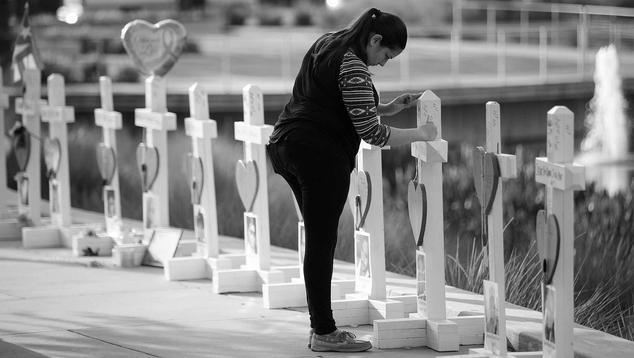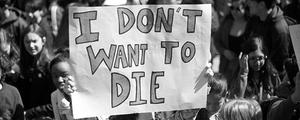Story Highlights
- Mental health system faulted by 83% for not flagging dangerous people
- Blame on extremist internet views has risen from 57% in 2013 to 79% now
- 58% blame inflammatory political rhetoric, up from 36% in 2013
WASHINGTON, D.C. -- Americans think there is plenty of blame to go around for the mass shootings that have become commonplace in the United States, but two factors are getting more blame than in the recent past.
- 79% now say the spread of extremist views on the internet bears a great deal or fair amount of blame, up from 57% in 2013 -- a 22-percentage-point increase.
- The majority, 58%, blame inflammatory statements by politicians or commentators, up from 37% in 2013 -- a 21-point increase. The increase may also reflect a wording change, as the 2013 question only asked about inflammatory statements by political commentators, whereas this year's wording asked about statements made by political commentators and politicians.
Both shifts mainly reflect large increases in the percentages of Democrats, including independents who lean Democratic, who rate these as important factors in mass shootings. Republicans' and Republican leaners' views have changed relatively little since 2013, except for a 16-point increase in those blaming online extremist views.
Since 2013, there has also been a slight increase in Americans blaming easy access to guns (up eight points to 69%) and a comparable decrease in those blaming violent entertainment (down eight points to 48%).
Meanwhile, the factor Americans blame most today remains failure by the mental health system to identify people who might be a danger to others. Eighty-three percent of U.S. adults say this contributes a great deal or fair amount to mass shootings, about the same as the 80% from six years ago. There has also been no significant change in those rating drug use (65%) or lack of security at public buildings (62%) as highly responsible.
| January 2011 | September 2013 | August 2019 | Change since 2013 | ||||||||||||||||||||||||||||||||||||||||||||||||||||||||||||||||||||||||||||||||||||||||||||||||
|---|---|---|---|---|---|---|---|---|---|---|---|---|---|---|---|---|---|---|---|---|---|---|---|---|---|---|---|---|---|---|---|---|---|---|---|---|---|---|---|---|---|---|---|---|---|---|---|---|---|---|---|---|---|---|---|---|---|---|---|---|---|---|---|---|---|---|---|---|---|---|---|---|---|---|---|---|---|---|---|---|---|---|---|---|---|---|---|---|---|---|---|---|---|---|---|---|---|---|---|
| % | % | % | pct. pts. | ||||||||||||||||||||||||||||||||||||||||||||||||||||||||||||||||||||||||||||||||||||||||||||||||
| Failure of the mental health system to identify individuals who are a danger to others | 78 | 80 | 83 | +3 | |||||||||||||||||||||||||||||||||||||||||||||||||||||||||||||||||||||||||||||||||||||||||||||||
| The spread of extremist viewpoints on the internet | 63 | 57 | 79 | +22 | |||||||||||||||||||||||||||||||||||||||||||||||||||||||||||||||||||||||||||||||||||||||||||||||
| Easy access to guns | 65 | 61 | 69 | +8 | |||||||||||||||||||||||||||||||||||||||||||||||||||||||||||||||||||||||||||||||||||||||||||||||
| Drug use | 77 | 66 | 65 | -1 | |||||||||||||||||||||||||||||||||||||||||||||||||||||||||||||||||||||||||||||||||||||||||||||||
| Insufficient security at public buildings including businesses and schools | n/a | 58 | 62 | +4 | |||||||||||||||||||||||||||||||||||||||||||||||||||||||||||||||||||||||||||||||||||||||||||||||
| Inflammatory language from prominent politicians or political commentators ^ | 44 | 37 | 58 | +21 | |||||||||||||||||||||||||||||||||||||||||||||||||||||||||||||||||||||||||||||||||||||||||||||||
| Violence in movies, video games and music lyrics | 58 | 56 | 48 | -8 | |||||||||||||||||||||||||||||||||||||||||||||||||||||||||||||||||||||||||||||||||||||||||||||||
| n/a=not asked; ^ 2011-2013 wording: Inflammatory language from prominent political commentators | |||||||||||||||||||||||||||||||||||||||||||||||||||||||||||||||||||||||||||||||||||||||||||||||||||
| Gallup | |||||||||||||||||||||||||||||||||||||||||||||||||||||||||||||||||||||||||||||||||||||||||||||||||||
Gallup first asked this question in 2011, but there was little change in Americans' ratings of the factors between that year and 2013.
The latest results come from an Aug. 15-30 Gallup poll, conducted after back-to-back shootings in Midland, Texas, and Dayton, Ohio, earlier in the month added 31 names to the list of people killed this year by lone gunmen.
Mental Health System Is Lone Factor Blamed Heavily
While majorities of Americans believe six of the seven factors bear at least a fair amount of responsibility for mass shootings, just one factor -- failure of the mental health system to flag dangerous people -- is seen by a majority (55%) as contributing a great deal to the problem. The spread of extremist viewpoints on the internet comes close, at 50%.
The only factor that a majority of Americans say bears not much or no blame at all is violence in entertainment.
| Great deal | Fair amount | Not much/Not at all | |||||||||||||||||||||||||||||||||||||||||||||||||||||||||||||||||||||||||||||||||||||||||||||||||
|---|---|---|---|---|---|---|---|---|---|---|---|---|---|---|---|---|---|---|---|---|---|---|---|---|---|---|---|---|---|---|---|---|---|---|---|---|---|---|---|---|---|---|---|---|---|---|---|---|---|---|---|---|---|---|---|---|---|---|---|---|---|---|---|---|---|---|---|---|---|---|---|---|---|---|---|---|---|---|---|---|---|---|---|---|---|---|---|---|---|---|---|---|---|---|---|---|---|---|---|
| % | % | % | |||||||||||||||||||||||||||||||||||||||||||||||||||||||||||||||||||||||||||||||||||||||||||||||||
| Failure of the mental health system to identify individuals who are a danger to others | 55 | 28 | 16 | ||||||||||||||||||||||||||||||||||||||||||||||||||||||||||||||||||||||||||||||||||||||||||||||||
| The spread of extremist viewpoints on the internet | 50 | 29 | 19 | ||||||||||||||||||||||||||||||||||||||||||||||||||||||||||||||||||||||||||||||||||||||||||||||||
| Easy access to guns | 48 | 21 | 30 | ||||||||||||||||||||||||||||||||||||||||||||||||||||||||||||||||||||||||||||||||||||||||||||||||
| Inflammatory language from prominent politicians or political commentators | 34 | 24 | 41 | ||||||||||||||||||||||||||||||||||||||||||||||||||||||||||||||||||||||||||||||||||||||||||||||||
| Drug use | 32 | 33 | 34 | ||||||||||||||||||||||||||||||||||||||||||||||||||||||||||||||||||||||||||||||||||||||||||||||||
| Insufficient security at public buildings including businesses and schools | 28 | 34 | 39 | ||||||||||||||||||||||||||||||||||||||||||||||||||||||||||||||||||||||||||||||||||||||||||||||||
| Violence in movies, video games and music lyrics | 25 | 23 | 52 | ||||||||||||||||||||||||||||||||||||||||||||||||||||||||||||||||||||||||||||||||||||||||||||||||
| Gallup, Aug. 15-30, 2019 | |||||||||||||||||||||||||||||||||||||||||||||||||||||||||||||||||||||||||||||||||||||||||||||||||||
Nine in 10 Democrats Blame the Internet, Access to Guns
Democrats' views about what is to blame for mass shootings have shifted markedly on several items in the past six years, spanning the transition from Barack Obama's presidency to Donald Trump's.
- The percentage of Democrats and Democratic leaners blaming inflammatory political language a great deal or fair amount has nearly doubled, from 42% in 2013 to 80% today. While this may partly reflect the inclusion of "politicians" in the 2019 question wording, a change since 2013, the bigger factor is likely that Trump, with whom they disagree politically, was not in office in 2013 but is today.
- The 90% of Democrats who blame extremist views on the internet is up from 61%, while the 90% who blame access to guns is up from 78%.
- Slightly fewer Democrats today (45%) than in 2013 (53%) blame violence in entertainment.
Republicans' views have not shifted nearly as much, with smaller increases in those blaming the internet (up from 53% in 2013 to 69% today) and security at public buildings (up from 55% to 62%), and a slight decline in those blaming violence in entertainment (down from 61% to 53%).
Apart from these trends, the party groups blame the mental health system and public building security about equally. However, Democrats assign much more blame than Republicans do to extremist viewpoints, access to guns, and inflammatory rhetoric, while Republicans assign more blame than Democrats to drugs and to violence in entertainment.
| Republican/Lean Republican | Democrat/Lean Democratic | ||||||||||||||||||||||||||||||||||||||||||||||||||||||||||||||||||||||||||||||||||||||||||||||||||
|---|---|---|---|---|---|---|---|---|---|---|---|---|---|---|---|---|---|---|---|---|---|---|---|---|---|---|---|---|---|---|---|---|---|---|---|---|---|---|---|---|---|---|---|---|---|---|---|---|---|---|---|---|---|---|---|---|---|---|---|---|---|---|---|---|---|---|---|---|---|---|---|---|---|---|---|---|---|---|---|---|---|---|---|---|---|---|---|---|---|---|---|---|---|---|---|---|---|---|---|
| % | % | ||||||||||||||||||||||||||||||||||||||||||||||||||||||||||||||||||||||||||||||||||||||||||||||||||
| Failure of the mental health system to identify individuals who are a danger to others | 85 | 80 | |||||||||||||||||||||||||||||||||||||||||||||||||||||||||||||||||||||||||||||||||||||||||||||||||
| The spread of extremist viewpoints on the internet | 69 | 90 | |||||||||||||||||||||||||||||||||||||||||||||||||||||||||||||||||||||||||||||||||||||||||||||||||
| Easy access to guns | 46 | 90 | |||||||||||||||||||||||||||||||||||||||||||||||||||||||||||||||||||||||||||||||||||||||||||||||||
| Drug use | 73 | 57 | |||||||||||||||||||||||||||||||||||||||||||||||||||||||||||||||||||||||||||||||||||||||||||||||||
| Insufficient security at public buildings including businesses and schools | 62 | 58 | |||||||||||||||||||||||||||||||||||||||||||||||||||||||||||||||||||||||||||||||||||||||||||||||||
| Inflammatory language from prominent politicians or political commentators | 39 | 80 | |||||||||||||||||||||||||||||||||||||||||||||||||||||||||||||||||||||||||||||||||||||||||||||||||
| Violence in movies, video games and music lyrics | 53 | 45 | |||||||||||||||||||||||||||||||||||||||||||||||||||||||||||||||||||||||||||||||||||||||||||||||||
| Gallup, Aug. 15-30, 2019 | |||||||||||||||||||||||||||||||||||||||||||||||||||||||||||||||||||||||||||||||||||||||||||||||||||
There are a few other notable subgroup differences in these views.
- Women are much more likely than men to blame mass shootings on violence in entertainment (55% of women vs. 40% of men).
- Women (80%) are more likely than men (56%) to blame access to guns.
- 62% of adults aged 55 and older say violent entertainment bears a great deal or fair amount of blame, versus 48% of 35- to 54-year-olds and 28% of those aged 18 to 34.
Bottom Line
U.S. leaders have repeatedly pledged to stop, or at least slow, the stream of mass shootings that have taken over 400 lives since the 2012 Sandy Hook Elementary School shootings, yet no political consensus has emerged on what to do.
Obama saw access to guns as the primary problem, but his post-Sandy Hook gun proposals failed to get through Congress over the next four years of his administration. Trump has pointed to mental health as the key culprit, and has cited violent video games, but has faced fierce resistance from public health experts and others who argue that stigmatizing mental illness isn't the answer. Some commentators have connected the political grievances motivating certain shooters with Trump's rhetoric, as well as the extremist viewpoints found in dark corners of the internet.
Americans largely agree that a number of factors are to blame -- chiefly reporting by the mental health system, the dissemination of extremist views online and easy access to guns. But they also seem receptive to the arguments that drug use and inflammatory political rhetoric may stoke the flames, while inadequate security at public buildings enables crimes to occur. The only explanation tested that Americans aren't sold on is that violence in entertainment contributes to mass shootings.
View complete question responses and trends.
Learn more about how the Gallup Poll Social Series works.




